‘Thriving business climate.’ Retail growing in several Eastern Kentucky downtowns
On a short walk through downtown Hazard, you can buy a T-shirt celebrating Appalachia and a three-wick candle, browse at a book store and a record store, get a latte at a coffee shop and a BLT wrap at a sandwich shop, and shop at a toy store for anything from dolls to train sets.
The Eastern Kentucky city of about 5,100 people has seen a resurgence of downtown retail businesses in the last four years.
In that time, more than 40 businesses have opened on or near Main Street and nearly all are still afloat, outlasting the worst health pandemic in a century and devastating flooding in the region last summer.
Coal jobs were once the cornerstone of the economy in many Eastern Kentucky counties but plunged beginning just over a decade ago. The region has lost population as people moved to find work.
But Hazard isn’t the only city in the longtime Eastern Kentucky coal counties seeing business growth downtown, as well as public artwork, parks, beautification projects, performance spaces and other amenities.
Not every downtown has seen as much development, but the growth shows there is a lot of opportunity in the region, officials interviewed for this story said.
“You can come to Eastern Kentucky and make an investment and get in on the ground floor of something that’s really exciting,” said Laura Adkisson, downtown development coordinator for Harlan Tourism. “I think reports of our decline are overexaggerated.”
‘Making the city better’
Hazard’s downtown has gone through an evolution like many others across Kentucky and the nation: a once-busy center of small shops and department stores that emptied out as businesses moved to shopping centers on highways skirting town, leaving downtown dominated by offices, banks and government buildings.
Downtown became a place people mostly went for appointments, not shopping or entertainment.
“You could do everything in downtown Hazard. Through the years that just completely died away,” said Joey McKenney, who grew up in town and owns Appalachian Apparel, which makes T-shirts.
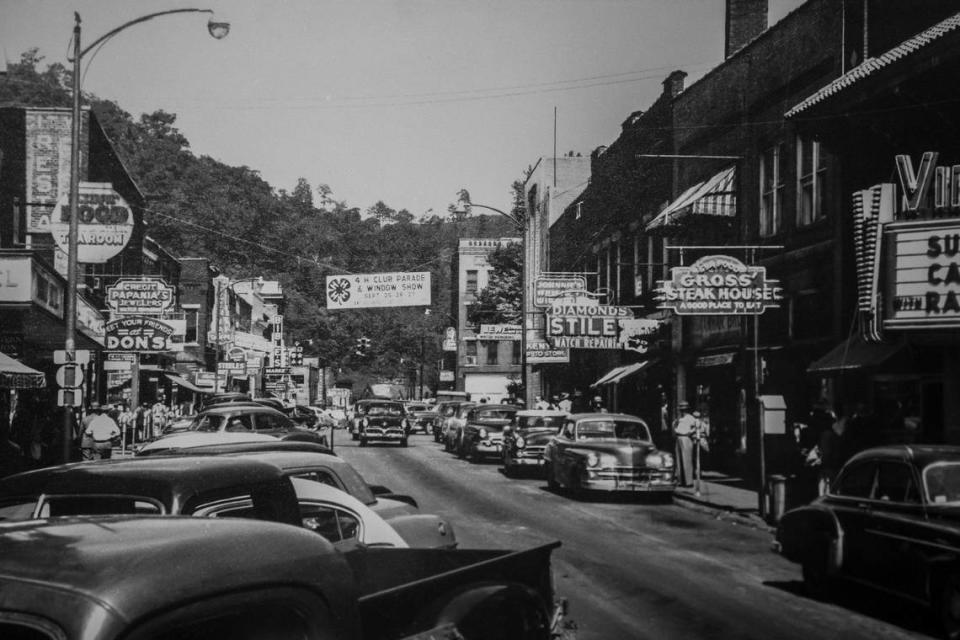
Local leaders and business stakeholders set out several years ago to try to reverse that.
One decision was for the city and county to pool resources to hire Bailey Richards as downtown coordinator, a position that hadn’t existed before. InVision Hazard, a citizens group set up to discuss ways to improve the city, had recommended the position.
Mandi Fugate Sheffel, who owns the Read Spotted Newt bookstore on Main Street in Hazard, said the city and county governments, led by Mayor Happy Mobelini and Perry County Judge-Executive Scott Alexander, deserve credit for working together and for hiring Richards to focus on developing downtown.
“I think her position is probably one of the most important parts of what’s happening downtown,” Sheffel said. “That was some action put into what they were trying to do.”
In some ways, Richards is an extra employee for businesses downtown.
She keeps up with what spaces are available to rent or buy and and has helped negotiate leases, design logos and even fetch milk for the Hazard Coffee Company.
The city created an incentive program — initially with money from the Foundation for Appalachian Kentucky, then with taxpayer money — to provide grants of up to $5,000 for signs, store fixtures and other needs.

It also approved an ordinance that can impose higher taxes on blighted or abandoned buildings as a way to try to get owners to fix them or sell them; upped enforcement of two-hour parking limits to keep spaces freed up; and paid to convert a former office building on Main Street into space for small retail shops, Richards said.
The Hazard Coffee Company is in that building. Getting access to the space with no renovation costs and a good rent has been a significant help, said Stephen Prosser, who owns the company with his wife, Maggie Francis Prosser.
“They’re not in the business of making money. They’re in the business of making the city better,” Prosser said of local leadership.
Kitty Dougood, head of the state’s Main Street program, said it was once rare for cities to offer incentives for downtown development, but it has become more commonplace.
The incentives range from free utility tap-ons to rent subsidies and grants to repair roofs.
Pineville was an early leader in using incentives to boost downtown development, including grants and a five-year moratorium on an increase in the property tax even if the value of a renovated property goes up.
Even though Bell County lost population between 2010 and 2020, the downtown area went from 80% vacant eight years ago to 100% occupancy by February 2020, said Jacob Roan, director of the city’s Main Street program.
The city has since helped others with information on incentives.
”We want to see the entire region grow and succeed,” Roan said.
‘Bringing downtown back’
Several business owners in downtown Hazard said incentives had helped, but weren’t the main reason they decided to open downtown instead of in a shopping center.
Many were motivated by wanting to be part of the move to revitalize retail in downtown.

McKenney said there were no other retail shops in downtown when he opened the Appalachian Apparel store on Main Street in September 2018. The business started as an online shop the year before.
It was a “big deal” to go downtown when he was growing up, McKenney said, and he wanted to be part of making downtown a shopping destination again.
“I love the idea of bringing downtown back,” he said.
Only three of the 40-plus businesses that have opened in downtown since early 2019 have closed, Richards said, a far lower percentage than the national average.
These days, however, the number of business owners who want to open downtown exceeds the number of available spaces that are ready, and owners of several existing businesses said their bottom lines have grown since opening in downtown.
Sheffel, for instance, started in a tiny space of just 250 square feet in early 2020 and had to move to a larger space before the year was out.
“I have had continued growth,” she said.
The Read Spotted Newt — the name is a combination of her love for reading and the bright salamanders Sheffel’s grandfather helped her look for as a kid — carries a range of books but has a special focus on ones by Appalachian authors or about the region.
“I think these are the books that people here can see themselves in,” Sheffel said.
At the Ready Set Play toy store, which opened on Main Street in Hazard in April 2022, owners Joey and Nikki Jones kept their full-time jobs as they built the business — he’s a social worker, she works in health care — but in March he left his job to focus on the store, and they hired their first part-time employee.
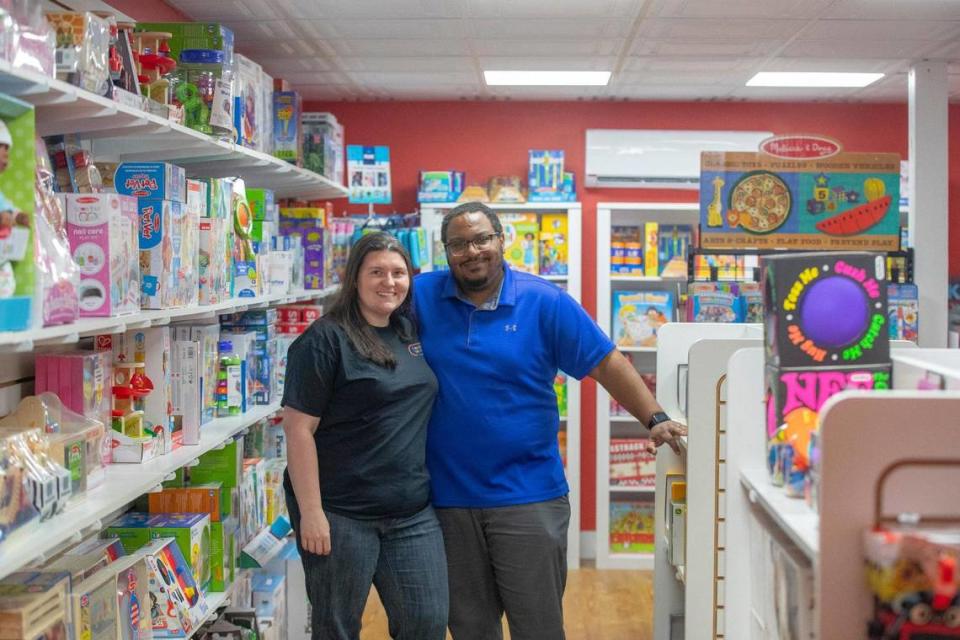
The toy store carries brands that big-box stores don’t sell, allows kids to play with toys before buying to see if they like them and sets up birthday registries, with discounts for buying from the list.
Online orders also have grown. One day in late March, Jones had orders going out to Florida, Tennessee, Nevada and California.
“We’re still gaining customers weekly,” he said.
Prosser, the Hazard Coffee Company owner, said his business has grown four times over since opening in May 2021.
‘Long term economic development’
McKenney, at Appalachian Apparel, and Randy Gabbard, owner of Coal Country Candles, share a building and said they have seen sales grow since opening in downtown as well.
McKenney, who sells online and in the store and does fundraisers to help local causes such as relief for the disastrous flooding in July 2022, said his sales grew 178% his first year in downtown and more during the coronavirus pandemic.
Gabbard, who makes candles on-site, doesn’t have any other employees yet, but said he may have to hire soon, and hopes to set up a process to let people pour their own candles.
“It’s been amazing over the last couple of years,” he said.
Richards said the stores downtown help promote each other and, in some cases, even sell each other’s merchandise.
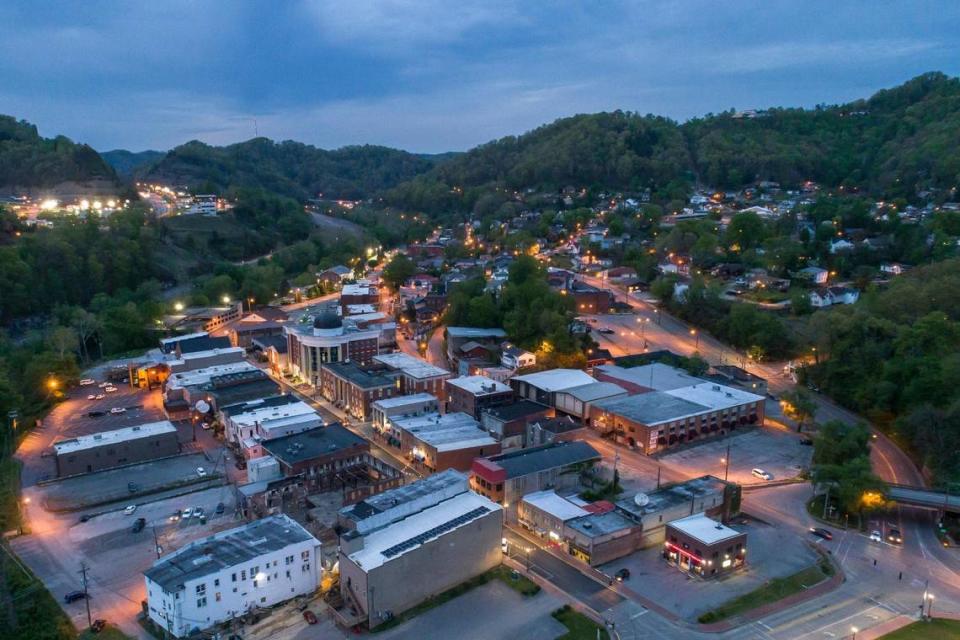
The stores that have opened in downtown Hazard in recent years have created more than 150 jobs, Richards said.
Improving downtown not only improves the quality of life for local people, but makes a place more attractive to investors, Richards said.
“Really, we see the investment in downtown and small business and retail and fun and all those things as an investment in long-term economic development,” Richards said.
‘Growth and diversification’
In Harlan, there are more small businesses in downtown than there were five years ago. Most of the places that are ready to be occupied without renovations, are, Adkisson said.
The occupancy rate in buildings downtown has increased from 76% in 2019 to 86%, Adkisson said, though there are fewer available buildings because of a fire and demolitions.
The city has added a dog park, a charging station for electric vehicles and a permanent stage for performances downtown, and has grants to improve building facades. Work is underway on developing an art center and a history museum, and the city just received a favorable study on the feasibility of building a mid-size hotel downtown, Adkisson said.
One of the additions is the Harlan Beer Company, a taproom and restaurant located in a renovated century-old building.
The business opened in October and has doubled the initial projection on sales, said owner Geoff Marietta.
“I do think there’s been a lot of growth and diversification over the last five years” in Eastern Kentucky, said Marietta, who also has a wedding and event space in Corbin called 2nd & Main and runs Invest 606, a non-profit that makes grants to small businesses in the region.
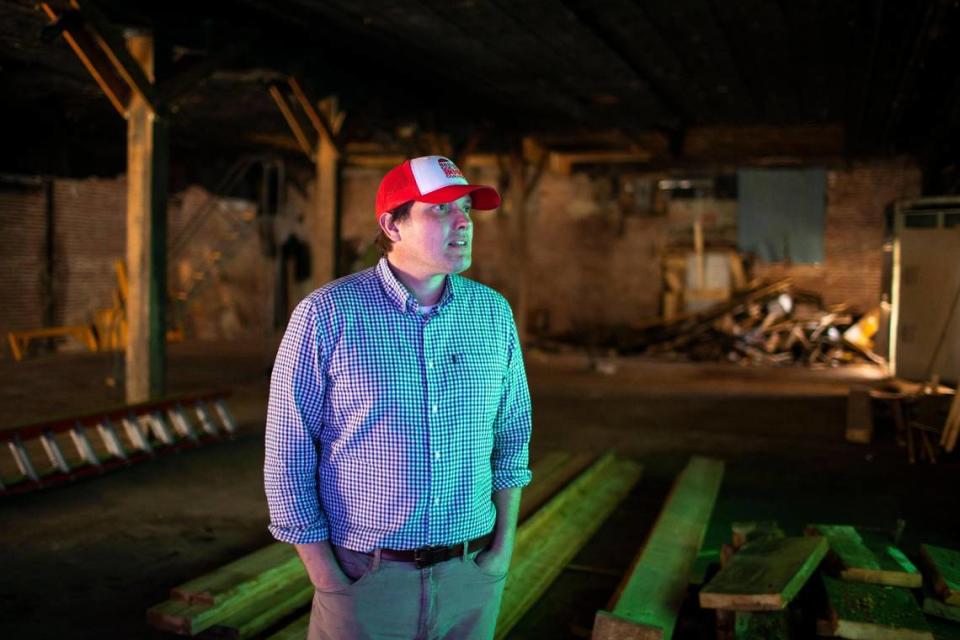
In Middlesboro, every usable space in downtown for a retail business is filled and there is a waiting list, said Joanie Jasper, executive director of the city’s Main Street program, which has pushed training for entrepreneurs.
Some building owners have reduced rent to make it easier for people to open businesses, and the city used $50,000 from federal COVID-19 relief money last year to subsidize rent for small businesses, Jasper said.
A number of downtown businesses have apartments on the second floor. Students who attend Lincoln Memorial University in nearby Harrogate, Tenn., rent many of them, and those students are helping drive retail development, Jasper said.
“We really have built up some momentum,” she said.
Officials in the region said other cities, including Pikeville and Ashland, have had success in building up downtown in recent years.
“All of our downtowns are so unique,” Dougood said.
‘Support local businesses’
Business owners and development officials said they think there are a number of reasons several Eastern Kentucky downtowns are seeing growth.
One is increased interest in shopping at locally-owned businesses.
“There’s been a big surge in people that want to support local businesses and not the big-box stores,” said Gabbard, owner of Coal Country Candles in Hazard.
Valerie Long Hinkle has seen the same thing at her business, Hill & Holler, which sell T-shirts and other gifts with an Appalachian theme in Cumberland, a town of about 1,900 people in Harlan County.
Hinkle studied architecture at the University of Kentucky and stayed afterward, living in Lexington a total of 13 years before moving home to Harlan County in 2015 to be closer to family.
Hinkle started selling online in 2013. By 2019, her business had grown to the point she moved into a building in downtown, and now has three part-time employees.
“I think people are hungry to support their local community,” said Hinkle, whose store is a full-throated tribute to Appalachian heritage and pride. “They are hungry to be able to shop in downtown.”
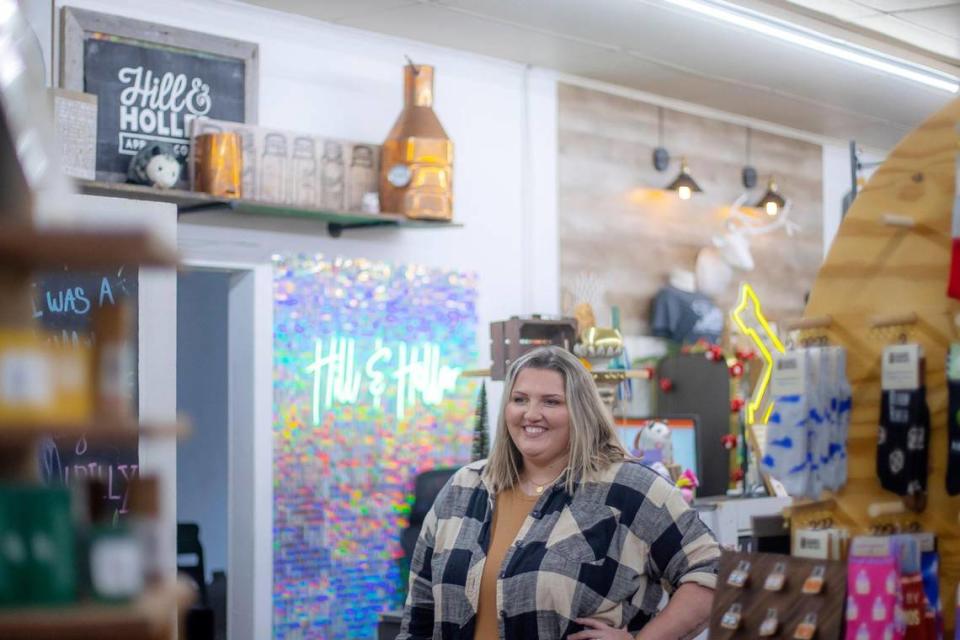
Sheffel, owner of the Read Spotted Newt, said it it was once a mark of success to get a big-box store in a town, but these days many people want to support local businesses.
“You know where the money’s going. The money stays in the community,” Sheffel said.
There are undoubtedly challenges in the region. The stock of affordable housing is tight and the poverty rate in Eastern Kentucky counties is more than double the national level.
Not all cities are doing as well. Blackey, a coal town in Letcher County, gave up its incorporated status last year and Vicco, another coal town in Perry County, will be dissolved this year after the government stopped functioning.
But local officials and business owners said health care, small business and tourism tied to the area’s natural beauty, history, and outdoor attractions are combining to reshape the economy, and improvements in internet service help businesses sell far beyond county borders.
The sharp decline in the coal industry has been painful for people who lost jobs, businesses that lost sales and local governments that lost tax revenue.
But it helped set the stage for small entrepreneurs to take chances, Adkisson said.
“What we formed from that is a thriving, locally-owned small business climate,” she said.
The growth of retail in several Eastern Kentucky downtowns also is being driven by people who moved away from the area for college or work but moved back in recent years to get closer to family or to get out of more crowded, costly places.
Hinkle said there was once an idea in Appalachia that young people had to leave to be successful, but that is changing.
“I think that Appalachia is on the cusp of something big,” she said.

